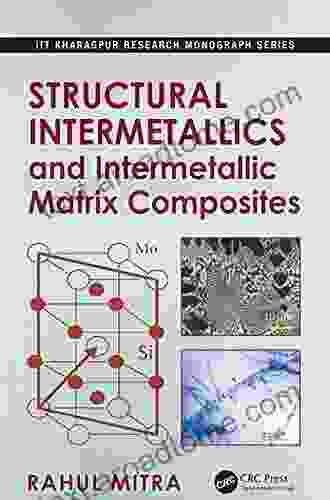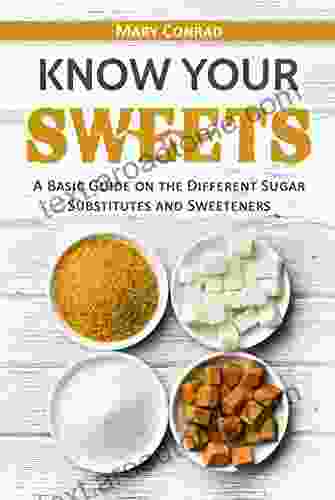The Essential Guide to Sugar Substitutes and Sweeteners: A Comprehensive Exploration

4.7 out of 5
| Language | : | English |
| File size | : | 3654 KB |
| Text-to-Speech | : | Enabled |
| Screen Reader | : | Supported |
| Enhanced typesetting | : | Enabled |
| Print length | : | 136 pages |
| Lending | : | Enabled |
In the realm of healthy eating and mindful consumption, sugar substitutes and sweeteners have emerged as viable alternatives to traditional sugar. Join us on an enlightening journey as we delve into the fascinating world of these substances, examining their properties, applications, and implications for health and well-being.
Unveiling the Sugar Substitute Spectrum
Sugar substitutes, also known as artificial sweeteners, offer a sugar-like taste without the associated calories or carbohydrate content. They are often employed in diet products, low-calorie beverages, and baked goods. Popular artificial sweeteners include:
- Aspartame (Equal, NutraSweet)
- Sucralose (Splenda)
- Saccharin (Sweet'N Low)
- Acesulfame potassium (Sunett, Sweet One)
- Neotame (Newtame)
Exploring the Realm of Natural Sweeteners
Natural sweeteners are derived from plant sources and provide sweetness with fewer calories than sugar. They often contain additional nutrients and may offer health benefits. Some common natural sweeteners include:
- Stevia (Truvia)
- Erythritol (Swerve)
- Monk fruit extract (Lakanto)
- Allulose (Alluvia)
- Xylitol (Xylichew)
Understanding Sweetness Intensity and Glycemic Index
Sweetness intensity refers to the relative sweetness of a substance compared to sugar. Artificial sweeteners are typically much sweeter than sugar, allowing for smaller amounts to achieve the same level of sweetness. The glycemic index (GI) measures how quickly a food raises blood sugar levels. Sugar substitutes and sweeteners generally have a low GI, indicating a slower and more gradual rise in blood sugar compared to sugar.
Navigating the Safety Concerns
The safety of sugar substitutes and sweeteners has been a topic of ongoing research and debate. While most artificial sweeteners approved for use by regulatory agencies are considered safe for consumption in moderate amounts, concerns have been raised about potential adverse effects, such as:
- Increased appetite and weight gain
- Alterations in gut microbiome
- Potential toxicity at high doses
It's crucial to consult with healthcare professionals for personalized guidance on the appropriate use and potential risks of sugar substitutes and sweeteners.
Choosing the Right Sugar Substitute for You
The ideal sugar substitute or sweetener depends on individual preferences, health goals, and dietary restrictions. Consider the following factors:
- Sweetness level
- Taste profile
- Calorie content
- Glycemic index
- Potential health effects
Consulting with a registered dietitian or other qualified healthcare professional can assist in making an informed decision that aligns with your specific needs.
Incorporating Sugar Substitutes and Sweeteners Responsibly
Incorporating sugar substitutes and sweeteners into your diet should be done with moderation and as part of a balanced approach to nutrition. Remember:
- Aim for a balanced diet that includes a variety of whole, unprocessed foods.
- Use sugar substitutes and sweeteners sparingly as a means of reducing sugar intake.
- Be mindful of the potential benefits and risks associated with different sugar substitutes and sweeteners.
- Consult with healthcare professionals for personalized guidance and monitoring.
Embark on a Healthier Sweetness Journey
Sugar substitutes and sweeteners can be valuable tools for reducing sugar intake, managing blood sugar levels, and achieving weight management goals. By understanding the various options, their properties, and potential implications, you can make informed choices about these substances. Remember to consult with healthcare professionals for personalized advice and incorporate sugar substitutes and sweeteners into your diet in a responsible and balanced manner.
4.7 out of 5
| Language | : | English |
| File size | : | 3654 KB |
| Text-to-Speech | : | Enabled |
| Screen Reader | : | Supported |
| Enhanced typesetting | : | Enabled |
| Print length | : | 136 pages |
| Lending | : | Enabled |
Do you want to contribute by writing guest posts on this blog?
Please contact us and send us a resume of previous articles that you have written.
 Book
Book Novel
Novel Page
Page Chapter
Chapter Text
Text Story
Story Genre
Genre Reader
Reader Library
Library Paperback
Paperback E-book
E-book Magazine
Magazine Newspaper
Newspaper Paragraph
Paragraph Sentence
Sentence Bookmark
Bookmark Shelf
Shelf Glossary
Glossary Bibliography
Bibliography Foreword
Foreword Preface
Preface Synopsis
Synopsis Annotation
Annotation Footnote
Footnote Manuscript
Manuscript Scroll
Scroll Codex
Codex Tome
Tome Bestseller
Bestseller Classics
Classics Library card
Library card Narrative
Narrative Biography
Biography Autobiography
Autobiography Memoir
Memoir Reference
Reference Encyclopedia
Encyclopedia Margaret Park Bridges
Margaret Park Bridges Roger Bartra
Roger Bartra Michael Anderson
Michael Anderson Mark B Gilgam
Mark B Gilgam Mercy Mary Otoijaghale
Mercy Mary Otoijaghale Robert James Trager
Robert James Trager T Nguyen
T Nguyen Matthew P Mayo
Matthew P Mayo Markus Kammermann
Markus Kammermann Sunil Pathak
Sunil Pathak Steve Luxenberg
Steve Luxenberg Mauricio Fau
Mauricio Fau Richard Robbins
Richard Robbins Stephanie Coontz
Stephanie Coontz Raghavendra Tippur
Raghavendra Tippur Todd H Doodler
Todd H Doodler Marc Spitz
Marc Spitz Matt Nelson
Matt Nelson Megan Hammond
Megan Hammond Max Mccoy
Max Mccoy
Light bulbAdvertise smarter! Our strategic ad space ensures maximum exposure. Reserve your spot today!

 William ShakespeareUnlocking the Strength of Structural Intermetallics and Intermetallic Matrix...
William ShakespeareUnlocking the Strength of Structural Intermetallics and Intermetallic Matrix...
 Guillermo BlairTsunami: A Spine-Chilling Adventure That Will Leave You on the Edge of Your...
Guillermo BlairTsunami: A Spine-Chilling Adventure That Will Leave You on the Edge of Your... Mikhail BulgakovFollow ·15.5k
Mikhail BulgakovFollow ·15.5k Dillon HayesFollow ·14.9k
Dillon HayesFollow ·14.9k Floyd PowellFollow ·4.5k
Floyd PowellFollow ·4.5k Josh CarterFollow ·4.4k
Josh CarterFollow ·4.4k Garrett PowellFollow ·6.8k
Garrett PowellFollow ·6.8k Bruce SnyderFollow ·13k
Bruce SnyderFollow ·13k Francisco CoxFollow ·13.6k
Francisco CoxFollow ·13.6k Gage HayesFollow ·4k
Gage HayesFollow ·4k

 Ralph Ellison
Ralph EllisonIntelligent Video Surveillance Systems: The Ultimate...
In a world...

 Jeffrey Cox
Jeffrey CoxThe Origins of the Modern World: A Journey to the Roots...
Embark on an Extraordinary...

 Paulo Coelho
Paulo CoelhoUnlock the Power of Integrated Medical Imaging with...
In the rapidly evolving...

 Charles Reed
Charles ReedThe Christ of the Covenants: Unlocking the Mystery of...
Embark on a Profound...

 Elton Hayes
Elton HayesComputational Hydraulics: A Comprehensive Guide for...
In the realm of fluid dynamics,...
4.7 out of 5
| Language | : | English |
| File size | : | 3654 KB |
| Text-to-Speech | : | Enabled |
| Screen Reader | : | Supported |
| Enhanced typesetting | : | Enabled |
| Print length | : | 136 pages |
| Lending | : | Enabled |










